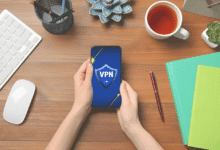How to Protect Yourself Against Hackers: Internet Safety

The Internet can be a dangerous place, especially if you have private information on your computer, phone, or other device that you don’t want anyone else to have access to or that is floating around the cloud. Unauthorized users only need one click to compromise your security and seriously harm you, which is unfortunate. No matter what website or app you use or how much information you make public, this Internet safety guide will help you safeguard yourself against hackers.
Update your applications and operating system.
Verify that your operating system and antivirus programme are both up to date.
Use secure passwords, and switch them out frequently.
Create secure passwords.
To secure your information from hackers, use strong passwords. Make sure a password you create is difficult for hackers to guess or crack. It should have letters, numbers, and symbols and be at least 8 characters long. Words from the dictionary or words you would use for your name shouldn’t be used as passwords.
Don’t click on email links
Never open a link in an email from someone you don’t know. Call the person and ask them if they can tell you over the phone if the email is from someone you know and they are informing you that anything is wrong.
Never open email attachments from senders you don’t know.
It’s wise to avoid opening email attachments from senders you don’t know. They could be scammers attempting to steal your identity or they could be viruses that can wipe out your hard drive. Call the sender to make sure the attachment is secure before opening it if you want to view it. If an email arrives with an attachment but no contact details, delete it.
Implement antivirus software
On each of your devices, make sure to install and keep up-to-date antivirus software, as well as a reliable firewall and other security tools. It’s crucial to keep your device’s operating system patched with the most recent updates. Implement two-factor authentication In order to access your account, two-factor authentication requires a second form of identification.
employ safe websites
Hackers can still access your personal information through some of the websites you visit, even with careful web browsing and upgrades. Try using secure websites if you want to safeguard yourself from these directed hacking attempts. The URL for these websites should begin with https rather than http. Think carefully before entering any personal information on a website that doesn’t begin with https. If you don’t want this site to know any more about you than it already does, do not visit it.
Do not divulge private information online.
There are numerous ways to defend yourself from hackers. Avoiding providing personal information online is one way. For each account, you should always use a different password that combines uppercase, lowercase, numbers, and symbols.
a copy of your data
One of the most vital things you can do is to protect your data. Always make a backup of your data if you’re using a laptop, and make sure it’s encrypted. If you’re unsure of how to proceed, look into the best encryption software for you.
Get a backup drive if you don’t already have one.











